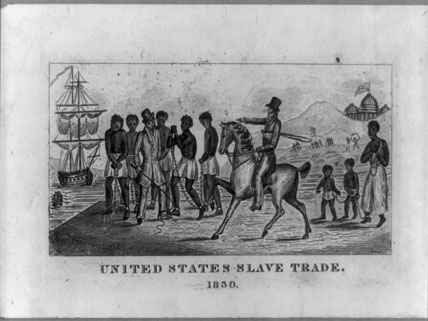
“United States’ slave trade, 1830”—an abolitionist engraving
According to Webster’s, the definition of the term reparations includes: “the act of making amends . . . or giving satisfaction for a wrong or injury”; “the payment of damages.” In American history, the term has applied to international relations, especially the reparations paid by Germany to the Allies after its defeat in World War I. For many years, the idea of reparations also has been debated in the context of the historic injustices that African Americans suffered as a result of slavery, various forms of legalized discrimination, and other mistreatment. Author, journalist, and educator Ta-Nehisi Coates has brought renewed attention to this subject with an impassioned article titled “The Case for Reparations” in the June issue of The Atlantic magazine.
In recounting the “Two hundred fifty years of slavery. Ninety years of Jim Crow. Sixty years of separate but equal. Thirty-five years of racist housing policy,” Coates is cogent and urgent. “Until we reckon with our compounding moral debts, America will never be whole.” he concludes. Few sensible people would disagree with Coates’s account in terms of injury and harm done. He details the brutality of slavery, cataloging the injustices suffered by African Americans through eloquently told stories of representative individuals like Clyde Ross, Henry Brown, and Mattie Lewis. Although Coates’s “Case” has been widely praised, it has also met with rebuttals, primarily in response to the prescriptions or solutions he offers.
Coates recognizes that the idea of reparations is fraught with contentious difficulties—questions of who would pay, how much, and to whom. His central demand is that support be put behind HR40, the Commission to Study Reparation Proposals for African Americans Act, a bill that has been introduced in Congress by Rep. John Conyers Jr. every session for the last 25 years. This bill does not detail a particular plan for reparations but merely calls for the issue be studied. It’s hard to argue with that.
Image credit: © Library of Congress, Prints and Photographs Division
Related Links
- “The Atlantic’s” Ta-Nehisi Coates Builds “A Case for Reparations”
Listen to this interview with writer Ta-Nehisi Coates, author of “The Case For Reparations”; transcript included.
(Source: NPR, May 23, 2014) - The Case For Reparations
Read the full article by Ta-Nehisi Coates that has rekindled the discussion of whether reparations should be paid to the descendants of American slaves; includes videos, photos, and primary sources. (Contains language some may find offensive.)
(Source: The Atlantic, May 21, 2014) - The Case against Reparations
Kevin Williamson critiques Coates’s approach while indicating some points of agreement.
(Source: National Review, May 24, 2014) - The Case Against Reparations for Slavery
This brief review, by law professor Richard Epstein, of Ta-Nehisi Coates’s article is from Defining Ideas, a journal of the Hoover Institution, a conservative public policy think tank; includes a link to Epstein’s more extensive legal opinion in 2004 on the subject that focuses on the statute of limitations.
(Source: Hoover Institution; accessed June 22, 2016)




Wow, I was astonished!!!!
slavery never should happened or never happen again
SLAVERY IS BAD READING THIS COMMENT MAKES U SWAG
slavery is a bad thing, and if your a bully you are just as bad as those slave owners….
that is bad